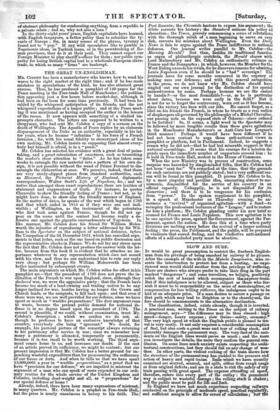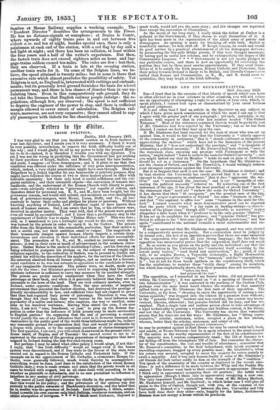SLOW AND SURE.
Pr would be great presumption to restrict the freeborn. English- man from his privilege of being-smashed by railway if he pleases. After the example of the wife in the Malade Imagtnaire, who re- sents= the intervention to protect her from a beating, no .expe- rienced man- would: shield another from the privilege of suffering. There are skaters who always prefer to take their fling in the part marked' " dangerous" ; and 'some travellers, we belige„ positively relish the zest of hazard which- accompanies theexpress-train. But-if this- indulgence is to be- allowed, subject as those who fur- nish- it must be to responsibility on the score of manslaughter,. or compensation for less willing sufferers,.the indulgence ought to-be laid at an adequate price: If a man desires to secure a passage' on that path which may lead to Brighton or to the churchyard, the fare should be commensurate- to the alternative destination..
The classification, indeed, exists already, though it is. inverted. A practical man, writing to the. Times on- the subject of railway management, says—" The difference may be thus classed : high speed—danger, heavy expense ; slow trains—safety, economy.* The- very high speed- at which the English: public is pleased to tra- vel is very wetly. It not only-requires a considerable consumption of fuel, but also costs a-great wear and tear of rolling stock, and incurably damages the permanent way. The very fact of the acci- dents on- the English lines would prove as much ;, and the more you investigate the details, the more they confirm the general con- clusion. On some lines much anxiety exists respecting the archi- tectural constructions, lest they should fail on any change of wear ther. In other parte, the violent rocking of the train. shows how the structure of the permanentway haayie/ded to the pressure and action- of heavy and. rapid trains: Neils which we have. recently examined are scarred,, seamed, and split, either from rough usage or from original defects; and are in a state to risk the safety of any trainpassing with great speed. The expense attending on speed,
therefore, enters into every part of the outlay : the permanent way is subject to wasteful damage ; the rolling stock is shaken ; and the public must be paid for life and limb. In England we have not much experience respecting railways conducted on the principle of moderate speed, practical regularity, and sufffcient margin to allow for errors of calculation; but the
Sambre et Meuse Railway supplies a working example. The 4, Resident Director" describes the arrangements to the Times.
has no distance-signals or semaphore ; at Braine le Comte, where upwards of eighty trains pass in and out between five o'clock a.m. and.ten at night, besides special ones, there is only a pointsman at each end-of the station, with a red flag by day and a red light at night; and there has been no collision, at least within the four years and a half of the writer's experience. But then, the fastest train does not exceed eighteen miles an hour, and lug- gage-trains seldom exceed ten miles. The rules are few ; bntthen, they are observed. If a train is late at the crossing station, another train waits for it, On some of the Belgian lines, we be- lieve, the speed attained is twenty miles; but in none is there that excessive rate which almost precludes the possibility of safety. Yet Belgium is not, as England is, intersected with cuttings and-embank- ments; but its generally level ground furnishes the basis for a level permanent way, and there is less chance of disaster thanin our un- dulating lines. Even in this comparatively safe ground, they do not take the licences that English railway people indulge : the re- gulations, although few, are observed ; the speed is not sufficient to deprive the engineer of the power to stop, and there is sufficient margin allowed to cover errors of calculation. The Belgian rail- ways, moreover, are not very expensive ; they, cannot afford to sup- ply passengers with tickets for the churchyard.



























 Previous page
Previous page